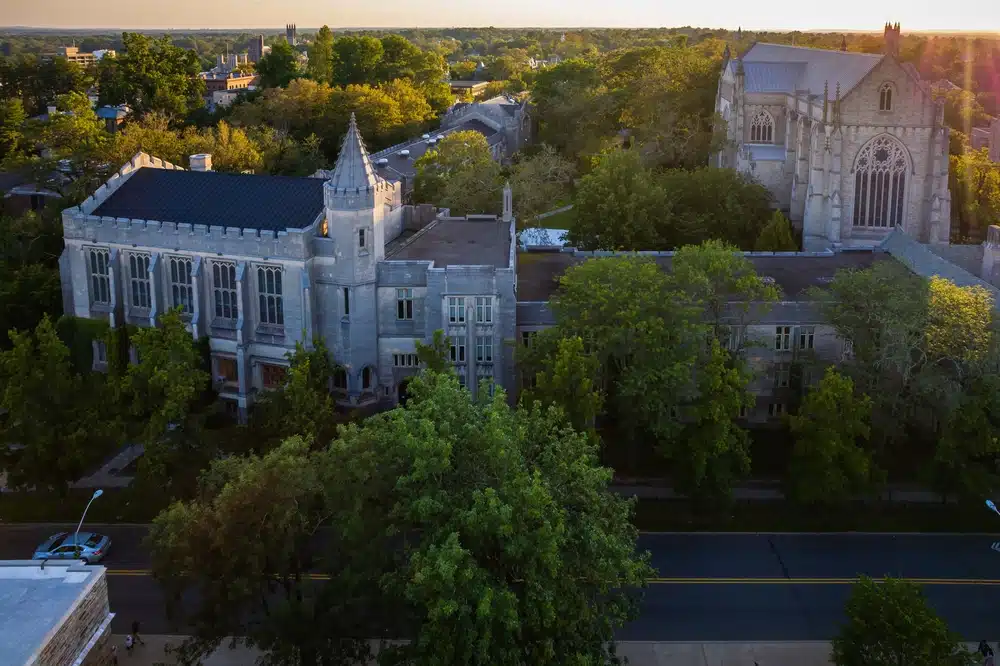Princeton Legacy Acceptance Rate
Does Princeton Consider Legacies?
Does Princeton consider legacies? The legacy status of Princeton is not heavily discussed on the university’s official websites. However, it does exist and has a significant impact on admissions. The Princeton legacy acceptance rate was 10% for the Class of 2026. In comparison with the 2018 admissions, over 30% of the “alumni children” were admitted, which is way higher than its minuscule 5% overall admissions rate.
Jim Wickenden ’61, who served as the Dean of Admission from 1978 to 1983, said that he went over eachg legacy application. Both the Office of Alumni Affairs and the Office of Annual Giving provided him with reports that told him whose alumni parents were “particularly loyal.”
In his 1980 “Report to the President,” he pointed out, “the extent to which [a] father was committed to and interested in the University” and was a factor that swayed admissions decisions in favor of legacy applicants who were “on the edge.”
While legacy status can be seen as a positive factor, it is important to note that it is by no means a guarantee of admission. Princeton University aims to create a diverse and talented student body, and as such, they maintain a rigorous and highly competitive selection process. Every applicant is evaluated individually, and the strength of their application is the primary determinant of their admission decision.
Over the years, there have been discussions and debates about the role of legacy status in college admissions, with some critics arguing that it may perpetuate privilege and limit opportunities for applicants from underprivileged backgrounds.
In response to these concerns, Princeton, along with several other colleges and universities, has expressed a commitment to ensuring a fair and equitable admissions process, with a focus on diversity and inclusion. As a result, the weight given to legacy status may have undergone changes to align with these values.
It is essential to remember that admission to highly selective institutions like Princeton is highly competitive, and a multitude of factors contribute to the final decision. While legacy status may play a role, prospective applicants should focus on presenting their best selves in their applications and showcasing their unique strengths and contributions to the academic community.
Additionally, it is always advisable for applicants to stay updated on Princeton’s latest admissions policies and practices, as they may evolve over time to reflect the university’s commitment to fostering a diverse and talented student body.
What Counts As A Legacy At Princeton?
If you wonder “What counts as a legacy at Princeton?”, a student’s mother, father, stepmother or stepfather must be a graduate of Princeton for them to be considered a legacy. Alumni ties from both the undergraduate and graduate levels carry the same weight.
On their applications, prospective students at Princeton are permitted to declare whether or not they have additional relatives who attended the institution; however, this status is not considered “children of alumni” status. It is important to note that the admissions office at Princeton does not consider the presence of siblings on campus when making decisions.
While legacy status may be taken into consideration during the admissions process, it is just one of many factors that the university evaluates. Aspiring Princeton applicants should focus on presenting their best selves, showcasing their unique qualities, and emphasizing their potential to contribute positively to the Princeton community.
What Percent of Princeton Students Are Legacies?
What percent of Princeton students are legacies? In Princeton’s Class of 2026, the Princeton legacy acceptance rate was 10%, which was similar to the rate in the previous admissions cycle. Comparing these legacy acceptance rates from the Class of 2024, it shows a 1.3% decrease from the 11.3 percent of admitted students who were legacies.
According to Princeton’s profile, the legacy applicants had the highest yield, which is the percentage of accepted students who ultimately choose to enroll at the university. This metric was compared to the other application categories.
Comparatively, only about 69 percent of all admitted students ultimately enrolled in the program.
Particularly in 2020, around ten percent is a percentage that has been reported at several different Ivy League colleges. It might appear to be a modest quantity, but there are quite a few legacies on campus. Although there has been a modest decrease in these numbers since the Class of 2020, they have largely remained unchanged.
At Princeton, a total of 684 legacy students applied for the Class of 2020, and 217 of them became part of the Princeton legacy acceptance rate. The overall acceptance rate is calculated to be 31.7% as a result of this. This rate was a significant increase from their annual average rate of 6.5%, which was a far cry from this rate.
Because of these two factors, this acceptance has probably decreased little during the past few years. For one thing, it is observed that the general decrease in admittance rates is due to the rise in the number of applications received.
Approximately 4.4% of applicants were accepted into Princeton University for the Class of 2026. Because of this, premier schools have become more selective overall. The second argument has to do with the fact that the percentage of legacy students on campus has decreased marginally, which may lead to a reduced admission rate for legacy students.
In recent years, the ethical propriety of legacies at prestigious educational institutions has come under scrutiny. Although this may also have an effect on the acceptance rate, it most likely has more of an impact on the reporting than it does on the actual acceptance rate. Thus, Princeton and other elite universities prefer to withhold their admission rates in the recent years.
Does Being A Legacy Help At Princeton?
At some universities, the legacy status of the applicant is a significant factor in the admissions process. Research conducted in 2011 found that legacy students “had a 45% greater likelihood of acceptance” than other applicants at the top 30 colleges in the United States.
Now, does being a legacy help at Princeton? Students that come from prestigious families are given significant advantages when applying to selective schools like Princeton. For instance, although only 5.5% of all applicants were selected for admission to Princeton for the Class of 2022, one-third of legacy applicants represent the Princeton legacy acceptance rate.
Former members of the admissions staff and academic deans have discussed how they handled legacy admissions. Dean of Admission Jim Wickenden, who also served as dean in the 1980s, is quoted as saying that he read every legacy application personally and instructed his staff to inform him of which alumni parents were “particularly loyal,” for example, who was donating to the school. If a parent provided financial assistance, it could influence choices that “were on the edge.”
Since the 1980s, a lot of things have changed, but a lot of other things have stayed the same. At a recent event celebrating Alumni Day, the current dean, Dean of Admission Karen Richardson, stated that legacy is utilized as a “tiebreaker,” but that students must still meet “all of the markers” to be admitted.
What has been asserted regarding legacy admissions for some time has been validated by these two deans. Even if you come from a long line of people, you still need to distinguish yourself.
In the past, some applicants stood out from the crowd because their families made significant financial contributions or because they were scouted for the football team. Although it could not be denied that things of this nature still occur, this is not the only method to stand out. Students also have the opportunity to distinguish themselves by being strong candidates, sometimes known as meeting “all the markers.”
It is essential that a legacy student possesses a competitive application at this point. This indicates outstanding grades, exam scores, participation in activities, and a stellar essay. They have to submit an application that is comparable to that of Princeton.
Working with college admissions consultants like AdmissionSight is something that is highly recommended in situations like this one. The method is not always simple to follow. The vast majority of students who submit applications to Princeton are, at the very least, strong contenders. To compete with other legacies, you need to distinguish yourself.
How Important Are Legacy College Admissions?
How important are legacy college admissions? Several colleges do not provide legacy students any sort of advantage. In general, less selective colleges do not take legacy status into consideration during the admissions process, in contrast to the more competitive schools.
Legacy status can play a significant impact on admissions decisions at Ivy League colleges and other prestigious universities; however, this is not the case at all of these schools. For example, MIT and the schools under the University of California system do not consider legacy when making admissions decisions.
Legacy status is utilized by private colleges and universities more frequently than by public schools. In a poll conducted by Inside Higher Ed in 2018, 42% of admissions directors at private schools reported that their institutions consider legacy status. On the other hand, only 6% of admissions directors at public schools reported doing the same.
According to research published by the Pew Research Center in 2019, most institutions admit the majority of the students who apply to them. In 2017, only 17 educational institutions accepted fewer than 10% of the applicants, while 29 educational institutions accepted 10% to 20% of the applicants. When compared to other factors, legacy status does not have a significant effect in admissions decisions at schools that are not among the most selective.
Even having legacy status does not ensure that applicants would get a slot. Even at prestigious universities such as Princeton and Harvard, the vast majority of legacy students who apply do not obtain an admission letter and be part of the Princeton legacy acceptance rate.
Now, you might ask, “Why does it matter to schools if your parents attended classes there thirty or forty years ago?” Legacy admissions are generally defended in public by educational institutions as a way to show respect for tradition. This is done as means to show appreciation for people who contributed to the establishment of the university.
Advocates of the practice frequently use the word “intergenerational continuity” in their arguments.
In exchange for respecting their heritage, legacy schools almost certainly anticipate receiving larger financial donations.
Nevertheless, research indicated that institutions that granted legacy status did not have any benefit over schools that did not do so in terms of fundraising. Two of the top eight schools in the United States with the highest endowments are Texas A&M (13.5 billion) and MIT (27 billion), both of which have prohibited legacy-based admission for more than a decade.
Regardless of how you feel about the equitable nature of legacy admissions, if you make the decision to benefit from them, you can disclose your legacy status by making a note of your ties with former students on the application.
There is a section on the application forms for almost all schools, including the Common Application, in which you can list the educational background of your parents. If you wish to make a claim on a secondary legacy, you will need to do so on the extra forms provided by each specific school.
Your chances of being accepted into their school of choice will improve if you maintain active involvement with the institution from which you graduated. The admissions office will look at the alumni’s history of monetary contributions, service on boards, and taking part in alumni interviews, among other things.
However, parents are obligated to exercise caution and tact during the entirety of this process. Sending or calling admissions representatives with an overly insistent tone will not be well received.
Moreover, a hostile and domineering approach will be off-putting to a school, and it may even wind up damaging an applicant’s chances of being accepted. Maintain a cheerful attitude and rest assured that the student and the parents will receive preferential treatment.
In the end, applying as a legacy student can help strengthen an otherwise great application, but it is not sufficient on its own to warrant admission on its own. Students need to think about how their academic profile compares to the admission standards of the university, and how their overall application, along with other factors like legacy status, should inform their application strategy come fall.
In addition, students need to consider how their academic profile should be structured. Seeing the Princeton legacy acceptance rate, students who want to make the most of their legacy status should mention their connections to alumni on their applications to colleges and universities. It could boost your chances of admission however, it does not end there.
A comprehensive analysis of the entirety of each candidate’s file is part of the admissions process at the university. The process involves a highly individualized evaluation of the applicant’s talents, achievements, and potential to contribute to learning at Princeton. No one aspect is assigned a fixed weight; rather, the process entails an evaluation of the candidate as a whole.
AdmissionSight can help you keep the other components of your application in check, whether you are a legacy student or not. AdmissionSight has one of the highest track records in the industry; sees an average of 75% of our students being accepted to Ivy League universities as well as Stanford, MIT, University of Chicago, and Caltech. Please feel free to contact us immediately to schedule an appointment for your initial consultation.










































